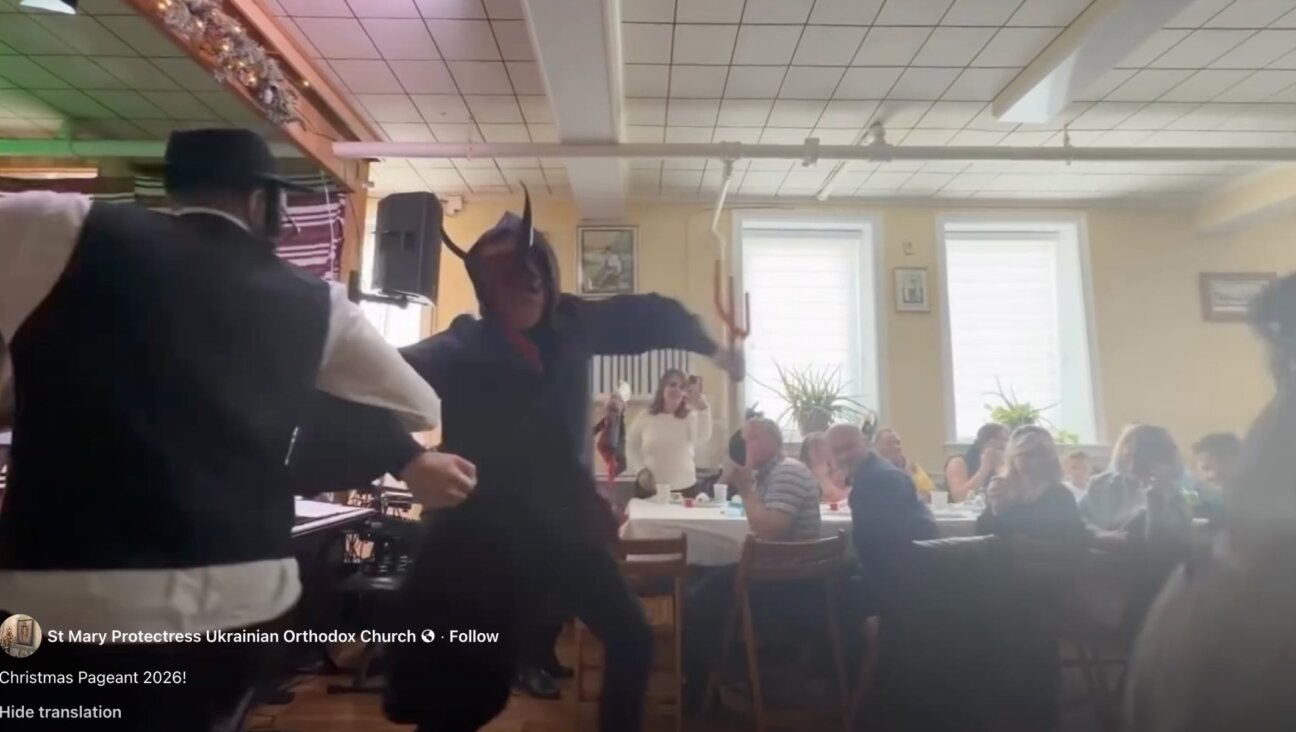Animal Rights Group Presses Fight Against Kapparot as Yom Kippur Approaches

Graphic by Angelie Zaslavsky
Between Rosh Hashanah and Yom Kippur, makeshift chicken coops appear on the streets and sidewalks of Hasidic Brooklyn neighborhoods like Borough Park and Williamsburg, dedicated to the ritual sacrifice of chickens for atonement in a centuries old practice known as kapparot, or kaporos.
After campaigning against the practice for years, the Alliance to End Chickens as Kaporos has redoubled its efforts against the ritual in a quarter page open letter to New York City Mayor Bill de Blasio, printed as an ad in the New York Times on Tuesday.
Running in the front section of the Times, the ad denounces a “bloodbath” that claims the lives of 50,000 chickens and occurs in “unregulated, makeshift slaughterhouses in Brooklyn streets and sidewalks in the days prior to Yom Kippur.”
Paid for by the Alliance, and its parent organization, the animal rights advocacy group United Poultry Concerns, the letter alleges the practice violates city and statutes on health, safety, and treatment of animals. It also charges that the city abets the ritual by “providing the practitioners with police protection, barricades, and orange cones that are used to bleed out birds whose throats have been cut.”
During the ritual, the worshipper swings a chicken over his head while reciting a prayer that asks for the remission of one’s sins. The chicken is then supposed to be slaughtered, with its meat donated to families in need.
According to Karen Davis, head of United Poultry Concerns, kapparot is practiced in a messy and cruel manner in the Brooklyn neighborhoods where it occurs. Additionally, she claims, it’s not even a necessary measure to atone before Yom Kippur.
“There’s no middle ground, but a radical ground on this issue,” said Davis, who wants the total abolition of chickens’ use as kapparot, rather than measures that purport to make this more humane. “They hold them by the wings, which isn’t natural for a chicken. It’s the ultimate expression of the callousness of this entire practice.”
She added that Jewish law, or halakha, does not require the use of chickens as kapparot, and that this is a matter of custom. Ultimately, she said, “the city needs to stop condoning this and enforce the laws on the books.”
United Poultry Concerns filed suit against city agencies claiming they failed to enforce laws that would forbid kapparot. New York Supreme Court Judge Debra James ruled against the group in a decision that Davis called political and said is under appeal. “We understand the politics of letting city agencies choose whether to enforce the law or not. This is a community with a great deal of influence in terms of votes. United Poultry Concerns has brought similar complaints in southern California.
Rina Deych, a founding member of the alliance, led a rally that attracted several dozen people on the steps of City Hall last week in which she demonstrated an alternative way of doing kapparot. Deych, who was raised ultra-Orthodox but left the community, says that she did not practice the ritual as a child and was appalled when she first encountered it as an adult.
“We were walking past this horrific scene, with chicken legs on the ground, chickens screaming, the butcher threw the live chicken to bleed out into the dumpster,” Deych recalled.
She also cast doubt on the notion the meat goes to charity: “Most of them end up in the garbage. That meat wouldn’t be edible because the chickens are deprived of food and water before killing, and they get injured and tossed around in the crates where they’re kept.”
State Senator Simcha Felder and City Councilman David Greenfield, who represents Borough Park, declined to comment or did not return request for comment by press time.
Dov Hikind, an assemblyman from Borough Park, savaged the animal rights activists.
“I wish those people who were so concerned about the chickens would involve themselves in the crisis in Syria,” he said. “There is no controversy, as long kapparot is done the right way [according to kosher laws].” He added, “Some people are just obsessed by this, they wait for this time of the year.”
Ezra Friedlander, a public affairs consultant and Borough Park resident, also disputed the negative characterization on the use of chickens as kapporot. “I practice the custom of kaporos. My wife and I and my children went into a place here on 14th Avenue [in Borough Park] in the back of a school. A young man helped us do it, he was very gentle. I’m very sensitive to anyone being mishandled, including animals,” he said.
Comparing the ritual to a parade, Friedlander said it might appear a public nuisance, but that it was legitimate for it to take place. “Sometimes you need to put up with something that’s inconvenient for the greater good.” He also cast doubt on Davis’ claims that chickens were not used for charity, saying, “I categorically don’t believe that. I know of organizations personally that make good use of these chickens.”
Responding to suggestions from Davis that Hasidic Jews use money or other items as kapparot, Hikind argued for accommodation based on “cultural differences.”
“There are traditions that go back a long, long time. it’s about respecting the cultural differences that exist among ourselves,” he said.
Friedlander said that such a change would have to come from within the community.
“You have to understand, when someone from outside the community suggests an alternative way of practicing Judaism, it’s a disqualifier in and of itself,” he said.
Contact Daniel J. Solomon at [email protected] or on Twitter @DanielJSolomon.
















